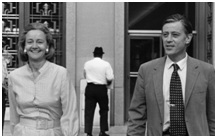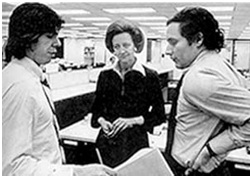|
 |
|
 |
|
|
||
Katharine Graham Leadership
Katharine Graham (1917-2001)
American owner (pictured right) of the Washington Post during its investigation of the Watergate scandal that led to president Richard Nixon’s resignation (made into a film, All the president’s Men). Nixon had authorized the break-in of the Watergate hotel in Washington during the Democratic Party convention.
Why was she a great leader?
1. Courage and determination Despite the shock of her husband, Philip’s, suicide in 1963, she took over control of the Washington Post. She risked prosecution over her publication of Watergate, despite her natural insecurity and fearfulness.
2. Vision When she took it over, the Washington Post was only an undistinguished regional newspaper. But she wanted it to become internationally recognized like the New York Times, bringing “readers
the information they need in a democratic society”. A vital step in achieving this aim was her courageous publication of the Pentagon Papers in 1971 that revealed government dishonesty over the Vietnam War (pictured right at the time with her editor, Ben Bradlee).
3. Pioneer for women’s rights She gradually gained confidence and authority after overcoming initial sexist opposition from many of her colleagues. In a male dominated business world, she was the only female boss in publishing and became a supporter of the fight for women’s rights, promoting sex equality at the Washington Post. 4. Great people She hired a great editor, Ben Bradlee and talented journalists like Bob Woodward and Carl Bernstein (pictured right together during Watergate), who uncovered the Watergate story. Dick Simmons, president of the Washington Post 1981-91 was also a great help to her. But the greatest influences on her life were her father, husband and close friend, Warren Buffett (pictured right below). 5. Learning Before she joined the Washington Post, she had been a full-time wife and mother and had little business experience. But she learned gradually (and sometimes painfully), relying on her great employees and listening to their advice.
6. Integrity and purpose People loved and respected her because she was decent and did what she thought was right. Her aim was to make the Washington Post a world-class quality newspaper based on her journalistic values of public service, balance and fairness. She evauated any reporting with three questions:
She fought for moral values and freedom of the press against a hostile government. Her honesty was illustrated by her candid discussion of her husband’s mental illness in her autobiography.
7. Luck She was born into a wealthy family, and she inherited the Washington Post from her father, who bought it in 1933.
8. Toughness She could be tough as well as kind, as she showed during:
Key quote on women in management Power has no sex. If one is rich and one’s a woman, one can be quite misunderstood.
Key quote on business success It's a pretty hairy existence, and nobody has it made. The minute you think do, you don't
Key quote on motivation To love what you do and feel that it matters – how could anything be more fun?
Key quote on age No one can avoid ageing, but ageing productively is something else.
Key quote on marriage When marriage works - and it does take a lot of work - it's the best way to live.
Key quotes on learning A mistake is simply another way of doing things. Some questions don’t have answers which is a terribly difficult lesson to learn. |
|
|
||
|
|
||
| Copyright © wisdomtowin.com 2025 All Rights Reserved | ||
|






